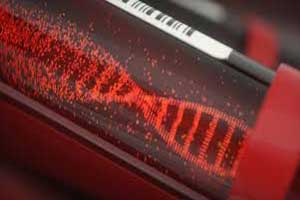- Home
- Editorial
- News
- Practice Guidelines
- Anesthesiology Guidelines
- Cancer Guidelines
- Cardiac Sciences Guidelines
- Critical Care Guidelines
- Dentistry Guidelines
- Dermatology Guidelines
- Diabetes and Endo Guidelines
- Diagnostics Guidelines
- ENT Guidelines
- Featured Practice Guidelines
- Gastroenterology Guidelines
- Geriatrics Guidelines
- Medicine Guidelines
- Nephrology Guidelines
- Neurosciences Guidelines
- Obs and Gynae Guidelines
- Ophthalmology Guidelines
- Orthopaedics Guidelines
- Paediatrics Guidelines
- Psychiatry Guidelines
- Pulmonology Guidelines
- Radiology Guidelines
- Surgery Guidelines
- Urology Guidelines
“Liquid Biopsy” Inexpensive blood test to spot early stage cancers

Researchers have identified inexpensive blood test to detect early-stage cancers .They have identified methylation patterns in cell-free DNA that are associated with specific tumor types.
The use of liquid biopsies for cancer detection and management is rapidly gaining prominence. Current methods for the detection of circulating tumour DNA involve sequencing somatic mutations using cell-free DNA, but the sensitivity of these methods may be low among patients with early-stage cancer given the limited number of recurrent mutation
A “liquid biopsy” is a blood test that can spot early-stage cancers by identifying circulating tumor cells or cell-free DNA from tumors that has been shed into the blood. Examining DNA for mutations typical of malignancies has yielded a relatively high false-negative rate. Investigators decided to look not at DNA structure (i.e., mutations) but rather at the pattern of genes that were turned on or off (i.e., methylation status).
Their technology could accurately detect the methylation pattern of very small amounts of circulating tumor DNA. Moreover, the methylation pattern of circulating tumor DNA matched the methylation pattern of the primary tumor tissue in the same patient. Seven different malignancies (e.g., lung, breast) were tested, and each had a characteristic methylation pattern. The technology then was tested in a new group of 199 patients with one of three different types of cancer and in 62 healthy controls. The accuracy of the test was very high (very few false negatives or false positives), even in patients with early-stage cancers.

Disclaimer: This site is primarily intended for healthcare professionals. Any content/information on this website does not replace the advice of medical and/or health professionals and should not be construed as medical/diagnostic advice/endorsement or prescription. Use of this site is subject to our terms of use, privacy policy, advertisement policy. © 2020 Minerva Medical Treatment Pvt Ltd